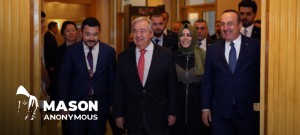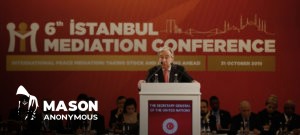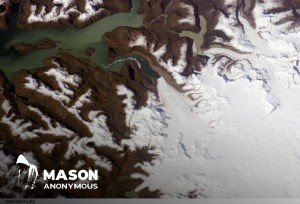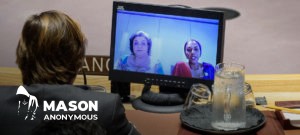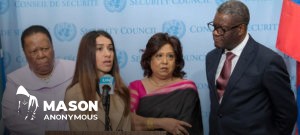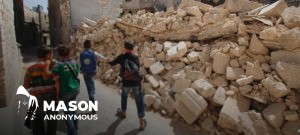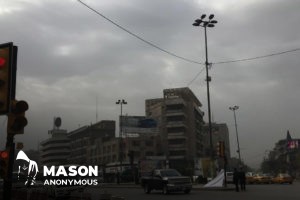Syria’s groundbreaking constitutional talks: ‘a clear success of mediation’ says Guterres in Turkey
Mediation is “one of our most important tools to reduce and end conflict”, United Nations Secretary-General António Guterres told the sixth Istanbul Mediation Conference, in the Turkish capital on Thursday.
Elaborating on the “positive results” that mediation and dialogue can bring, he referred to signs of progress by Syrian leaders who are meeting in Geneva after nearly nine years of brutal civil war, as “no clearer illustration of the importance of political solutions to conflict”.
Read the full story here.
Severe food insecurity alert for 45 million people across Southern Africa
Forty-five million people in southern Africa are expected to face severe food insecurity in the next six months as the worst drought in decades continues to bite, the World Food Programme has warned.
In an attempt to boost aid efforts and international awareness ahead of the lean season, WFP said that the 16-nation region has seen normal rainfall in just one of the last five growing seasons.
On top of that, back-to-back cyclones and flooding have destroyed harvests and left communities even more vulnerable.
Nine countries are of particular concern: Angola, Zimbabwe, Mozambique, Zambia, Madagascar, Malawi, Namibia, Eswatini and Lesotho.
The agency’s Margaret Malu, who’s the acting Regional Director for Southern Africa, has called for help to meet the “emergency food and nutrition needs” of millions of people.
She also wants investment to help people withstand “ever more frequent and severe droughts, floods and storms”.
According to the International Panel on Climate Change, Southern Africa’s temperatures are rising at twice the global average.
Rights experts call for release of Palestinian hunger striker
A Palestinian hunger-striker who was held in solitary confinement in Israel for more than a month, should be released immediately, UN-appointed independent rights experts said on Thursday.
In a statement, the six experts said that Heba Al-Labadi was arrested by Israeli soldiers in Jenin, in the West Bank, in late August.
She then faced 30 days of interrogation for up to 20 hours a day, they say, before being sentenced to five months’ detention, without being told the charges or evidence against her.
Following sentencing, Ms. Al-Labadi launched a hunger strike, which is in its sixth week. She was transferred to hospital last Sunday, suffering from several medical conditions.
In an appeal to the Israeli authorities to free her, the rights experts highlighted that while administrative detention is not prohibited under international law, its widespread use in Israel was “incompatible” with international humanitarian law and international human rights law.
New WHO report targets leading causes of urban deaths
Cities are home to more than half of the people on earth, 40 million of whom die every year from heart disease, cancer, diabetes and lung disease.
Now, in a bid to tackle these preventable diseases – and take on another urban killer, road accidents – the UN health agency has come up with a 10-point blueprint for safe cities.
It’s been inspired by successful policies already in place around the world, from smoke-free measures in Bogor, Indonesia to road safety initiatives in Ghana’s Accra.
A “walkable streets” plan in New York city is also highlighted by the World Health Organization, which says that it reduced elderly pedestrian fatalities by 16 per cent. The report was supported by WHO Global Ambassador and former long-term New York City Mayor, Michael Bloomberg.
It highlights how cities in the developing world are where 85 per cent of all non-communicable disease deaths happen, and where almost all fatal road traffic accidents occur.
WHO researchers say that the economic benefits for low and middle-income countries could be at least $350 billion.
Spain offers to host COP25 after Chilean withdrawal
Inundated with massive protests, Chilean President Sebastián Piñera announced on Wednesday that Santiago would not be able to host the UN climate summit in December.
However, thanks to “a generous offer of support” from Spain, UN Climate Change Executive Secretary Patricia Espinosa said in a statement on Thursday that the UN Climate Change Conference (COP25) could now be held in Madrid “on the same dates as originally planned”.
“We are hopeful that the COP Bureau can consider this proposed solution as soon as possible”, Ms. Espinosa asserted. “It is encouraging to see countries working together in the spirit of multilateralism to address climate change, the biggest challenge facing this and future generations”.
The 11-day conference aims to bring together delegates from 190 countries to discuss how to reduce global carbon emissions in line with the Paris Agreement.
Iraq at ‘a crossroads’
As demonstrations continue across Iraq, UN Special Representative Jeanine Hennis-Plasschaert has been talking to some protesters, noting on Thursday that “women, men, the young and the elderly” are all “united under the Iraqi flag in their love for their country”.
Arguing that democracy has “given Iraqis the right to have their voices heard and to hold their leaders to account”, she observed that “today Iraq stands at a crossroads”.
“Progress through dialogue” is the only way, she reiterated, or face “divisive inaction”.
Advocating for public national dialogue to bring Iraqis together for an inclusive, stable and prosperous country, Ms. Hennis-Plasschaert underscored that “full access to all information, facts and figures will prove key”.
The Special Representative recalled the UN’s recent 74th anniversary celebration, noting that its fundamental principles “are more important than ever: ‘to reaffirm faith in fundamental human rights’ and ‘to promote social progress and better standards of life in larger freedom’”.
“Iraq is in the United Nations, and the United Nations is in Iraq”, she concluded. “Today we stand by your side and are ready, if called upon, to bring together all parties and move forward on a roadmap that meets the legitimate demands of the Iraqi people.”
Listen to or download our audio News in Brief for 31 October on SoundCloud:

